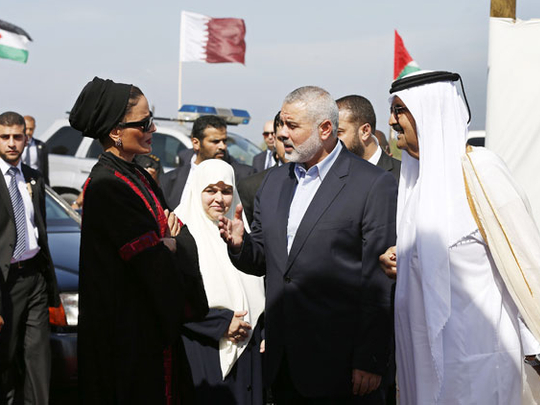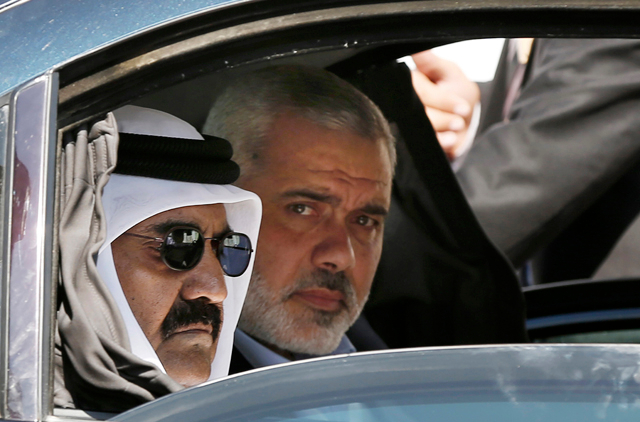
Dubai: By visiting the Hamas-ruled Gaza on Tuesday, Qatar’s emir demonstrated a long-standing policy of boosting both the regional influence of his state, analysts said.
“Qatar saw the Arab revolutions as an opportunity rather than a threat,” said Brookings Doha director Salman Shaikh.
“They understood where the centre of gravity of the region is, instead of the others who were trying to maintain the old order.”
According to Shaikh, Qatar’s support for the Islamists is “not purely dogmatic or ideological.”
The Gulf state has “built relationships over decades” with the Islamists because “there was a feeling these people had integrity and capability compared.”
Since his rise to power in 1995, Shaikh Hamad has hosted several Islamist leaders while Qatar’s Al Jazeera pan-Arab news broadcaster has provided an open platform for them to air their views.
He has maintained good relations with Hamas in particular, playing host to the the group’s political leader Khalid Mesha’al in 1997 following an attempt by Israeli agents to assassinate him in Jordan.
He has also worked towards a reconciliation between the Hamas and Fatah.
Shaikh Hamad yesterday became the first Arab head of state to visit the troubled Gaza Strip since 2007, a trip which may see an increase in political and economic support to the Islamist movement boycotted by the international community.
Doha is increasing its investment in rebuilding Gaza to $400 million (Dh1,46 billion), up from $254 million, Gaza’s Hamas premier Esmail Haniya said during the landmark visit to the impoverished territory.
The emir was not visiting the West Bank town of Ramallah, the Palestinian seat of government where President Mahmoud Abbas, who heads Fatah, is based.
But Palestinian analysts have said Shaikh Hamad had called Abbas to “reassure” him that his country was not taking sides in the five-year conflict between Fatah and Hamas.
Israel was less understanding of Shaikh Hamad’s apparent preference for Hamas.
“We find it weird that the emir doesn’t support all of the Palestinians but sides with Hamas over the Palestinian Authority [in the West Bank]which he has never visited,” Israeli foreign ministry spokesman Yigal Palmor told.
“The emir has chosen his camp and it is not good.”
Lebanese analyst Abdul Wahab Badrakhan argued that Qatar was not seeking to empower Hamas, but rather wanted to “contain it.”
“Qatar has always supported Hamas, but I think this visit by the emir is intended to contain Hamas more than support it,” said Badrakhan.
He argued that Qatar saw an opportunity to compensate for any support which Hamas has lost from more traditional allies in Syria and Iran.
“Hamas has severed ties with Syria and it will do so with Iran as well but not without ensuring alternative support,” a role Qatar appears happy to fill, said Badrakhan.
Hamas’s politburo chief Mesha’al has left Damascus, his base for many years, and relocated to Doha, severing ties with President Bashar Al Assad’s regime which has been battling a Sunni-dominated rebellion since March 2011.
Qatar is “currently playing the role of a regional power,” said Paul Salem, head of the Beirut-based Carnegie Middle East Centre.
“It is true that it is more close to Islamists, but it aspires to become a diplomatic power. This would allow it to play an international role as the key to the Middle East,” he said.
Qatar is putting to use its links with Islamists who have taken power in the Arab Spring countries.
The chief of Tunisia’s Ennahda Islamist movement, Rached Ghannouchi, chose Doha for his first visit abroad after his party won the country’s post-uprising elections.
Qatar also announced in September plans to invest $18 billion over five years in Egypt where the Muslim Brotherhood rose to power after the exit of president Hosni Mubarak.
But Qatar’s politics also provoke criticism in some Arab countries.
In Libya, some politicians have accused the nation of meddling in the internal affairs of the North African nation.
They say it is trying to capitalise on the sympathy it earned in the country after it provided financial, military and political support for the rebellion last year.
Critics of Qatar also question the motivations of the wealthy US ally which is home to America’s largest military base in the region.
Badrakhan, however, does not see a contradiction. He spoke of a tacit US understanding of Qatar’s policy.
“With the Arab Spring, the United States felt that there was an opportunity, if not for reconciliation, at least for a truce with political Islam. They saw that Qatar was ready to play this role,” he said.
— AFP













